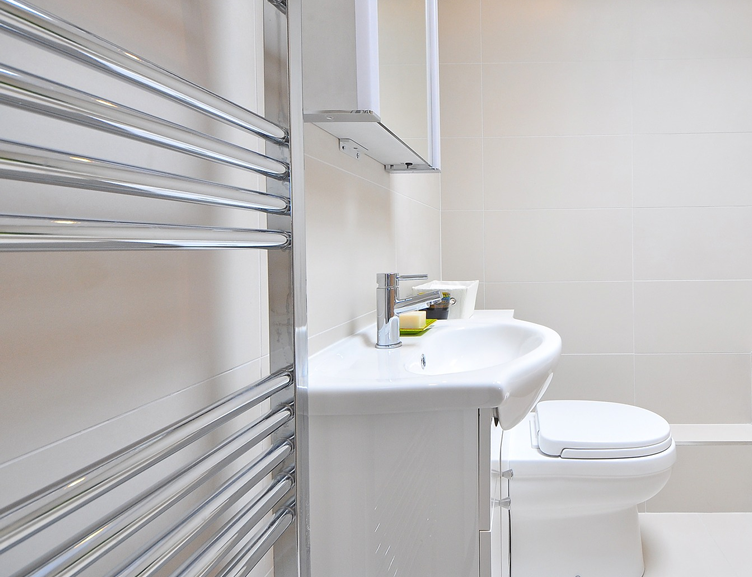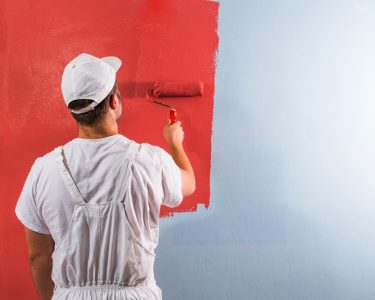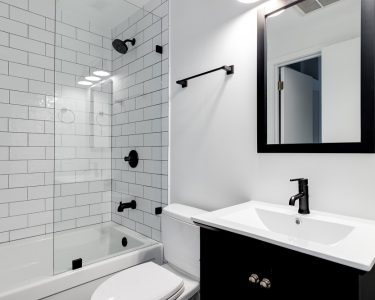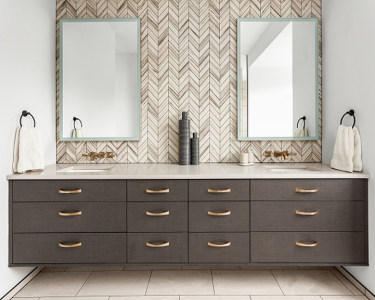Why NJ Homeowners Should Understand Bathroom Permit Rules
New Jersey bathroom remodels should be exciting, not confusing or overwhelming. You probably have tons of questions, including whether you need a building permit to renovate your bathroom. The fact these rules vary from town to town only muddies those waters. What’s acceptable in one area may need inspection in another.
For homeowners in Short Hills, understanding when a permit is required can save time, money, and frustration. This guide explains when you’ll need a permit, when you might not, and how a licensed bathroom remodeling contractor in Short Hills NJ can handle the entire process for you. Involving a knowledgeable contractor from the get-go helps your project follow local building codes. It also aligns with current bathroom remodel permit requirements in Millburn Township 2025.
If you’re still early in the planning stage, you might also find it helpful to read what’s typically the most expensive part of a bathroom remodel. Understanding cost drivers can help you budget before applying for permits.
Quick Answer: When You Need a Bathroom Remodel Permit in New Jersey
Yes, most bathroom remodels in New Jersey need a permit, especially if they involve moving plumbing or electrical lines, changing walls, or altering the room’s structure. Cosmetic updates—like repainting, re-tiling, or replacing fixtures in the same location—usually don’t need one. Always check with your local construction department before beginning any remodel.
Projects That Always Need a Bathroom Remodeling Permit in NJ
Permits ensure all work meets New Jersey’s building codes and safety standards. If your project goes beyond surface-level updates, you’ll likely need one.
You’ll likely need a permit for:
- Structural work: Removing or adding walls, expanding the bathroom, or changing the ceiling height.
- Plumbing changes: Moving sinks, toilets, tubs, or showers; installing new water or drain lines.
- Electrical upgrades: Adding or moving outlets, recessed lighting, or exhaust fans.
- HVAC changes: Installing or relocating vents or ductwork.
- Windows or skylights: Creating new openings or enlarging existing ones.
- Mechanical additions: Radiant heat flooring, water heaters, or spa tubs.
| Type of Work | Permit Needed? | Reason |
| Move a toilet or shower | Yes | Plumbing line change |
| Add recessed lighting | Yes | Electrical rewiring |
| Replace vanity and sink in same spot | No | Cosmetic replacement |
| Install new tile or flooring | No | Non-structural update |
| Add skylight | Yes | Roof structure alteration |
It’s understandable to see permits as just red tape. But they’re there to protect homeowners by verifying that work is safe, energy-efficient, and compliant with the NJ Uniform Construction Code. A skilled bathroom remodeling contractor in Short Hills NJ can determine which parts of your project need permits. They’ll also submit all necessary paperwork, ensuring full NJ building code compliance for remodels.
If your project includes moving outlets or lighting, review why your project needs a local electrical supply partner — this is often part of meeting both safety and permit requirements.
When Do I Need a Permit for Bathroom Renovation in Short Hills?
Not every update needs formal approval. If your project is just cosmetic and doesn’t change plumbing, electrical, or structural components, you may not need a permit.
Common examples include:
- Painting, wallpapering, or refinishing cabinets
- Installing new mirrors, towel bars, or shelving
- Replacing existing fixtures in the same location
- Re-tiling walls or floors without altering layout
- Updating faucets or countertops connected to existing lines
But, the line between cosmetic and structural can be thin. You might need to move drain lines a tiny bit if you’re replacing a vanity. Adding a larger mirror may expose wiring requiring upgrades to meet current standards. Even minor changes can uncover conditions that need inspection.
Short Hills homeowners, especially those in older homes, should be cautious. Many prewar properties have plumbing and wiring systems that aren’t code-compliant. Even simple updates can trigger review requirements when they expose flaws like this.
Swapping a light fixture in the same location may be cosmetic. But adding a new switch or circuit will need an electrical permit. Likewise, installing a new bath fan or running extra ductwork changes airflow paths. That generally needs township approval.
Tile and waterproofing changes can also edge a project into the permit zone. A tub-to-shower conversion sounds cosmetic, but installing a new pan, linear drain, or curbless entry usually affects subfloor structure.
The best approach is to discuss your plans with a bathroom remodeling contractor in Short Hills NJ before any work starts. A short review call or site visit can confirm whether you need permits. That’s keeping your project compliant and avoiding surprise delays later. If you’re dealing with Short Hills home renovation permits, you’ll thank yourself for this.
Before diving in, check out the importance of layout in bathroom and kitchen remodeling — it’s one of the biggest factors influencing whether structural permits are required.
Step-by-Step: How the Bathroom Permit Process Works in Short Hills
The Millburn Township Construction Department, which enforces the Uniform Construction Code, issues all permits in Short Hills. They designed the process ensure safety, but it can feel overwhelming for first-time remodelers.
Here’s how it usually works:
- Submit applications: Complete the building, plumbing, and electrical forms. They’re available online or at the township office.
- Provide documentation: Include the scope of work, drawings, and product specifications. Structural changes may need stamped architectural plans.
- Pay permit fees: Costs depend on project value and subcodes involved.
- Await review: Simple remodels often receive approval within 5–10 business days.
- Schedule inspections: Plumbing, electrical, and building inspections occur at different stages of construction.
- Receive final approval: After passing all inspections, you’ll receive a Certificate of Approval for your records.
During inspections, officials look for:
- Proper GFCI outlets near water sources
- Correct venting for plumbing and fans
- Waterproofing and spacing in wet zones
- Secure drain, vent, and supply lines
Either the homeowner or the contractor can be listed as the applicant, though most homeowners let their contractor file. Licensed professionals know the local subcode officials and can respond to any clarification requests. Even when the contractor handles paperwork, the homeowner remains responsible for keeping approval copies on file.
Inspections happen in sequence—rough plumbing and electrical before closing walls, and final checks after installing fixtures. A brief pre-inspection walkthrough with your contractor confirms everything is ready and avoids failed inspections.
Timelines can vary, so submitting complete applications and coordinating with product delivery times helps keep the remodel on schedule.
A professional bathroom remodeling contractor in Short Hills NJ will manage each step, coordinate inspections, and communicate with township officials. Once complete, store your approval paperwork with home records. It’s proof your remodel meets local code and makes a great tool when refinancing or selling your home later.
What Happens If You Skip a Bathroom Remodel Permit in NJ
Skipping permits might save time upfront, but it often creates bigger problems later. Unpermitted work can lead to stop-work orders, costly corrections, or even fines from the township.
Potential consequences include:
- Stop-work orders: Township officials can shut down your project if they discover unapproved work.
- Expensive fixes: You might need to reopen walls for inspectors to check hidden wiring or plumbing.
- Resale complications: Buyers and lenders may ask for proof of permits and final approvals.
- Insurance denial: Insurance companies may deny claims tied to unpermitted work.
- Fines: Some municipalities charge daily penalties for unapproved construction.
There are also serious safety reasons for following the rules. Bathrooms combine electricity and water; an inherent risk. Missing GFCI protection or poorly vented fans can cause shock hazards and moisture damage. Faulty plumbing connections may lead to leaks or mold that affect other parts of your home.
The financial fallout can get nuclear. Back-permitting usually requires inspections, drawings, and sometimes demolition to verify compliance. Contractors may charge more for remediation because they assume liability for preexisting work.
Simple preventive steps protect you from these headaches. If you’ve already started without permits, pause and ask about back-permitting instead of moving forward. A licensed bathroom remodeling contractor in Short Hills NJ can guide you through the fastest, most compliant path forward.
You can also learn when it’s worth upgrading before listing your home in Should You Renovate Your Bathroom Before Selling Your Millburn NJ Home?.
Why Working with a Licensed Bathroom Remodeling Contractor Matters
A licensed contractor manages the entire process of compliance and quality. From completing township paperwork to coordinating inspections, their expertise prevents the red flags that often slow down DIY remodels.
A professional bathroom remodeling contractor in Short Hills NJ:
- Understands township codes and NJ’s Uniform Construction Code
- Prepares and submits all permit documentation
- Coordinates with inspectors at each stage
- Ensures work meets code requirements the first time
- Provides records for future insurance or resale purposes
Hiring a professional also streamlines scheduling. Inspections, materials, and subcontractors can all overlap if not managed carefully. An experienced contractor keeps everything in sequence. When it’s all sequential, your remodel stays on time and within scope.
If you’re comparing firms, you might also like Your Guide to Morris Plains NJ Home Remodeling Contractors for insights on how to evaluate local professionals.
Key Takeaways for NJ Homeowners Planning a Bathroom Remodel
- Permits are required for plumbing, electrical, and structural work.
- Cosmetic updates like painting or fixture swaps often don’t need them.
- Millburn Township oversees the permit process for Short Hills.
- Licensed contractors streamline applications and inspections.
- Skipping permits risks fines, insurance issues, and reduced resale value.
- Keep records of all approvals for future property transactions.
Partnering with a knowledgeable bathroom remodeling contractor in Short Hills NJ ensures your project is code-compliant, efficient, and built to last.
Make Your Short Hills Bathroom Remodel Smooth and Compliant
Bathroom renovations can improve comfort and value, but ignoring permit rules can cause major setbacks. Permits ensure your remodel meets safety standards, protects your investment, and maintains your home’s integrity.
Before you begin, confirm requirements with your township or consult an experienced bathroom remodeling contractor serving Short Hills NJ who handles permitting daily. With expert help, you can enjoy a smooth remodeling experience that’s both beautiful and compliant.
If you’re planning a project in Short Hills or nearby, contact a bathroom remodeling contractor in Short Hills NJ who manages permits, inspections, and construction from start to finish.





